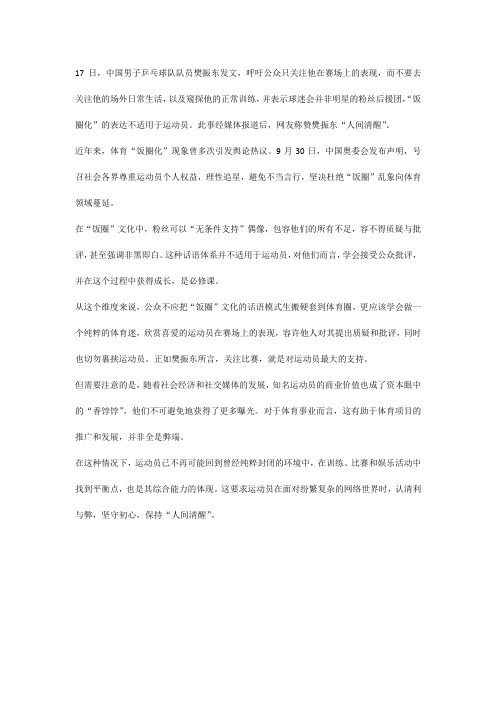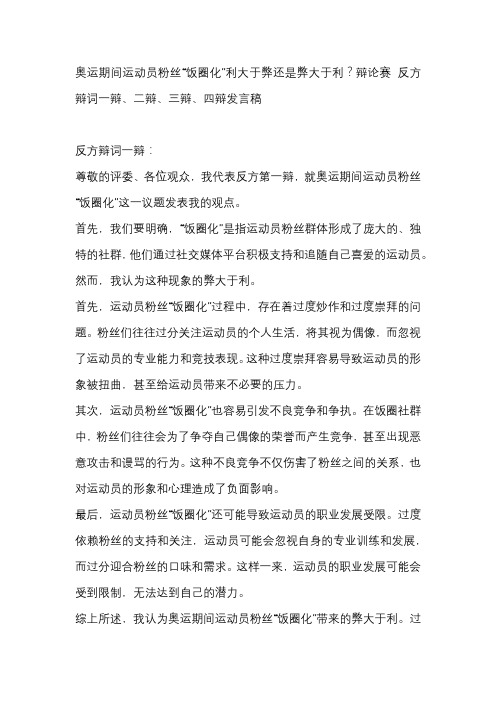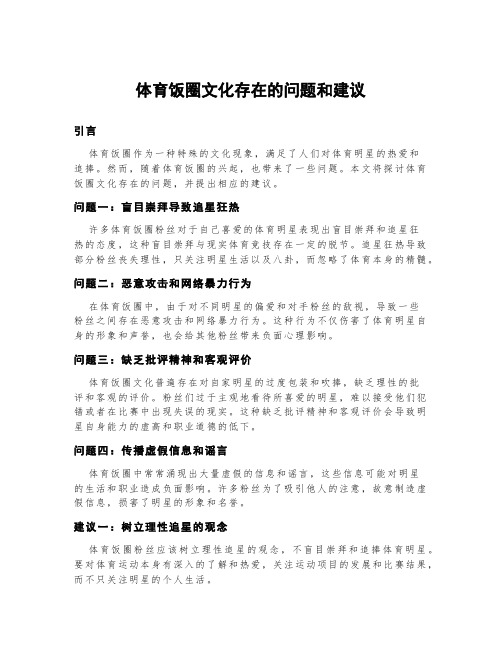体育饭圈化对策建议
奥运会运动员饭圈化辩论作文

17日,中国男子乒乓球队队员樊振东发文,呼吁公众只关注他在赛场上的表现,而不要去关注他的场外日常生活,以及窥探他的正常训练,并表示球迷会并非明星的粉丝后援团,“饭圈化”的表达不适用于运动员。
此事经媒体报道后,网友称赞樊振东“人间清醒”。
近年来,体育“饭圈化”现象曾多次引发舆论热议。
9月30日,中国奥委会发布声明,号召社会各界尊重运动员个人权益,理性追星,避免不当言行,坚决杜绝“饭圈”乱象向体育领域蔓延。
在“饭圈”文化中,粉丝可以“无条件支持”偶像,包容他们的所有不足,容不得质疑与批评,甚至强调非黑即白。
这种话语体系并不适用于运动员,对他们而言,学会接受公众批评,并在这个过程中获得成长,是必修课。
从这个维度来说,公众不应把“饭圈”文化的话语模式生搬硬套到体育圈,更应该学会做一个纯粹的体育迷,欣赏喜爱的运动员在赛场上的表现,容许他人对其提出质疑和批评,同时也切勿裹挟运动员。
正如樊振东所言,关注比赛,就是对运动员最大的支持。
但需要注意的是,随着社会经济和社交媒体的发展,知名运动员的商业价值也成了资本眼中的“香饽饽”,他们不可避免地获得了更多曝光。
对于体育事业而言,这有助于体育项目的推广和发展,并非全是弊端。
在这种情况下,运动员已不再可能回到曾经纯粹封闭的环境中,在训练、比赛和娱乐活动中找到平衡点,也是其综合能力的体现。
这要求运动员在面对纷繁复杂的网络世界时,认清利与弊,坚守初心,保持“人间清醒”。
奥运期间运动员粉丝“饭圈化”利大于弊还是弊大于利?辩论赛 反方辩词一辩、二辩、三辩、四辩发言稿

奥运期间运动员粉丝“饭圈化”利大于弊还是弊大于利?辩论赛反方辩词一辩、二辩、三辩、四辩发言稿反方辩词一辩:尊敬的评委、各位观众,我代表反方第一辩,就奥运期间运动员粉丝“饭圈化”这一议题发表我的观点。
首先,我们要明确,“饭圈化”是指运动员粉丝群体形成了庞大的、独特的社群,他们通过社交媒体平台积极支持和追随自己喜爱的运动员。
然而,我认为这种现象的弊大于利。
首先,运动员粉丝“饭圈化”过程中,存在着过度炒作和过度崇拜的问题。
粉丝们往往过分关注运动员的个人生活,将其视为偶像,而忽视了运动员的专业能力和竞技表现。
这种过度崇拜容易导致运动员的形象被扭曲,甚至给运动员带来不必要的压力。
其次,运动员粉丝“饭圈化”也容易引发不良竞争和争执。
在饭圈社群中,粉丝们往往会为了争夺自己偶像的荣誉而产生竞争,甚至出现恶意攻击和谩骂的行为。
这种不良竞争不仅伤害了粉丝之间的关系,也对运动员的形象和心理造成了负面影响。
最后,运动员粉丝“饭圈化”还可能导致运动员的职业发展受限。
过度依赖粉丝的支持和关注,运动员可能会忽视自身的专业训练和发展,而过分迎合粉丝的口味和需求。
这样一来,运动员的职业发展可能会受到限制,无法达到自己的潜力。
综上所述,我认为奥运期间运动员粉丝“饭圈化”带来的弊大于利。
过度炒作和崇拜、不良竞争和争执,以及对运动员职业发展的限制,都是我们应该关注和警惕的问题。
谢谢!反方辩词二辩:尊敬的评委、各位观众,我代表反方第二辩,继续阐述我们反方的立场。
我们承认,“饭圈化”现象在奥运期间的确存在,但我们认为其中的利大于弊。
首先,运动员粉丝“饭圈化”为运动员提供了更广泛的支持和关注。
粉丝们通过社交媒体平台积极传播运动员的信息和成绩,为他们扩大了知名度和影响力。
这种支持和关注不仅能够激励运动员在比赛中取得更好的成绩,也有助于推动运动事业的发展。
其次,运动员粉丝“饭圈化”为粉丝们提供了一个共同的社群和交流平台。
粉丝们可以在饭圈社群中分享自己对运动员的喜爱和支持,交流彼此的观点和感受。
申论热点:理性看待体育圈饭圈文化

申论热点:理性看待体育圈饭圈文化运动员因出色的比赛成绩获得关注的同时,还吸引了体育爱好者之外的粉丝,其关注点从体育竞技本身转向运动员的外表、商业代言和私生活,奥运会修正审美,运动员成新偶像。
这过程中,不良“饭圈”习气暗流涌动,运动员遭遇网络暴力,需全社会关注及警惕。
公务员考试角度解读【提出观点】冬奥会开展时,在运动员群体成为“全民新偶像”的同时,跟拍、上门直播、私信骚扰、粉丝群体互撕等侵犯运动员个人隐私、干扰运动员训练和赛事运行的不良“饭圈”行为逐渐露头,成为潜在风险,引发社会争议。
【综合分析】近年来,中国运动员每逢重大赛事总有较佳成绩,公众关注度显著提升,尤其是2021年以来,文娱明星频频“翻车”,加之文娱领域综合治理工作不断加码,企业、平台转而寻求“更安全、更主流、更向上的流量”,运动员群体的商业价值越来越被重视,中国代表队选手斩获冬奥会历史首金后,其新浪微博热搜榜几乎“承包”了全天的网络顶级流量,健康阳光的形象使运动员成为“全民新偶像”,网友声称说“奥运会狠狠修正了我的审美”。
既让运动员“出圈”出彩,又防范“饭圈”侵蚀体育领域。
一方面,与体育竞技无关的运动员花边话题蹭起体育赛事热度,频频抢占网络热搜榜,通过明星球员构建起主队球迷的归属感,让更多人关注运动、现场观看比赛,乃至亲身参与体育运动,都是大家乐见的;另一方面,评论区有“饭圈化”趋势,针对运动员的网络暴力也有所增加,如跳水运动员全红婵夺得金牌后,部分粉丝及网络主播涌入全红婵家中“打卡”甚至直播;又如运动员张伟丽卫冕冠军失败受到不理智网民的攻击,东京奥运会上射击选手王璐瑶比赛失利后在网上贴出自拍照却遭遇网民谩骂,既影响运动员家人的正常生活,也让运动员产生心理压力,产生畏惧心理。
当前国内体育界在推动运动员“出圈”和防“饭圈文化”侵袭上的探索,折射我国体育产业供需不平衡、专业化品牌塑造不足、赛事运营有待提升经验等问题,一些平台、媒体等对赛事内容本身挖掘能力弱,才转而将目光投向花边。
体育行业存在的意见与建议

体育行业存在的意见与建议一、体育行业的现状及问题体育作为一项重要的社会活动和文化事业,不仅是健康生活的促进者,也是国家形象的展示者。
然而,伴随着人们对健康生活的需求增加,体育行业也面临着诸多问题与挑战。
本文将以体育行业存在的意见与建议为出发点,探讨当前体育行业中存在的问题,并提出相关建议。
1.1 体育设施与场馆不足在城市化进程和人口快速增长的背景下,社会对公共体育设施和场馆的需求日益强烈。
然而,目前我国大多数地区尤其是农村地区,公共体育设施和场馆建设严重滞后于需求。
这导致了人们参与体育运动的机会减少,无法实现全民健身政策的落实。
针对这一问题,首先应该加大对城市和农村地区公共体育设施和场馆建设投入力度。
政府可以通过增加财政投资、引导社会资本参与等方式来改善当前不足的情况。
第二,应加强管理和维护,确保建设出的体育场馆能够充分利用并长期发挥作用。
此外,可以鼓励社区和学校共享体育场馆资源,提高利用率。
1.2 运动员培养与选拔机制有待完善在当前全民健身进程中,对于青少年运动员的培养和选拔具有重要意义。
然而,目前我国体育系统存在着许多问题,例如过分追求短期成绩,长时间压力过大等现象。
这导致了激烈竞争意识形态、培养方式的单一性,并缺乏个性化的教育和关怀。
为了解决这些问题,我们应该加强政策制定与实施。
首先,在制定培养计划时要考虑到运动员个人特点和需求的多样性。
其次应鼓励各种不同类型的运动项目开展与推广。
此外还可以加强学校与社会组织合作,共同促进科学合理地培养年轻人参与体育运动。
二、体育行业存在的意见与建议2.1 加大对体育事业投入力度面对当前体育行业面临的各种问题,政府应该增加对体育事业的资金投入。
通过加大财政拨款、吸纳社会资本等方式,提高体育基础设施的建设和管理水平。
此外,还可以制定相关激励措施,鼓励企业和个人参与到体育事业支持中来。
2.2 加强体育文化的传承与创新在体育行业发展过程中,文化作为核心要素不可忽视。
体育饭圈文化存在的问题和建议

体育饭圈文化存在的问题和建议引言体育饭圈作为一种特殊的文化现象,满足了人们对体育明星的热爱和追捧。
然而,随着体育饭圈的兴起,也带来了一些问题。
本文将探讨体育饭圈文化存在的问题,并提出相应的建议。
问题一:盲目崇拜导致追星狂热许多体育饭圈粉丝对于自己喜爱的体育明星表现出盲目崇拜和追星狂热的态度,这种盲目崇拜与现实体育竞技存在一定的脱节。
追星狂热导致部分粉丝丧失理性,只关注明星生活以及八卦,而忽略了体育本身的精髓。
问题二:恶意攻击和网络暴力行为在体育饭圈中,由于对不同明星的偏爱和对手粉丝的敌视,导致一些粉丝之间存在恶意攻击和网络暴力行为。
这种行为不仅伤害了体育明星自身的形象和声誉,也会给其他粉丝带来负面心理影响。
问题三:缺乏批评精神和客观评价体育饭圈文化普遍存在对自家明星的过度包装和吹捧,缺乏理性的批评和客观的评价。
粉丝们过于主观地看待所喜爱的明星,难以接受他们犯错或者在比赛中出现失误的现实。
这种缺乏批评精神和客观评价会导致明星自身能力的虚高和职业道德的低下。
问题四:传播虚假信息和谣言体育饭圈中常常涌现出大量虚假的信息和谣言,这些信息可能对明星的生活和职业造成负面影响。
许多粉丝为了吸引他人的注意,故意制造虚假信息,损害了明星的形象和名誉。
建议一:树立理性追星的观念体育饭圈粉丝应该树立理性追星的观念,不盲目崇拜和追捧体育明星。
要对体育运动本身有深入的了解和热爱,关注运动项目的发展和比赛结果,而不只关注明星的个人生活。
建议二:倡导积极健康的网络文化体育饭圈应该倡导积极健康的网络文化,提倡粉丝之间互相尊重和友善相处。
要远离恶意攻击和网络暴力行为,将粉丝之间的互动转化为积极向上的力量,为明星提供正能量的支持。
建议三:鼓励批评和客观评价体育饭圈粉丝应该鼓励批评精神和客观评价,理性看待明星的表现和行为。
要学会接受批评和能够对自己喜爱的明星进行客观评价,不为个人偏见影响判断力,同时也要善于发现明星的优点和进步之处。
抵制体育饭圈化的认识和看法

抵制体育饭圈化的认识和看法嘿,大家好呀!今天咱来唠唠抵制体育饭圈化这个事儿。
你说体育,那本该是充满激情、汗水和拼搏的纯粹领域,可现在呢,却有点变味啦。
就好像原本清清爽爽的一杯水,被人加了些奇奇怪怪的调料进去。
咱就想想看啊,运动员们在赛场上努力奋斗,为的是啥?是为了突破自我,为国家争光,为梦想拼搏呀!可要是被饭圈那一套给缠上了,那得多别扭。
本来大家是因为热爱体育,欣赏运动员的技艺和精神才关注的,结果呢,变成了疯狂追星似的,只看脸,只看人气,这不是胡闹嘛!
就好比一场精彩的足球比赛,大家本该为球员们的精彩配合、绝妙进球而欢呼喝彩,结果有些人却只关心哪个球员长得帅,然后疯狂追捧,甚至为了他去攻击其他球员,这不是瞎捣乱吗?这还是我们热爱的体育吗?
再说说那些粉丝之间的争斗,哎呀呀,那叫一个乱呀!为了自家喜欢的运动员,互相攻击、谩骂,这成何体统呀!体育的精神去哪儿了?难道体育就是用来让你们这样瞎折腾的?运动员们努力训练、比赛,可不是为了让你们在这儿瞎起哄的。
而且呀,这种饭圈化还容易让运动员们迷失方向呢。
本来心思都该放在训练和比赛上,结果整天被这些乱七八糟的事情干扰,还怎么专心提升自己呀。
就好像一只鸟,本来应该自由自在地在天空飞翔,却被一些线给缠住了,飞都飞不起来啦。
咱得清醒清醒呀,别让体育变了味。
我们要回归到体育的本质,去欣赏运动员们的拼搏、努力和坚持,而不是被那些表面的东西给迷惑了。
我们要为每一个努力的运动员鼓掌,而不是只捧一个踩一群。
让我们一起抵制体育饭圈化,让体育回归它原本该有的样子。
别再让那些不纯粹的东西来玷污我们热爱的体育啦!大家说,对不对呀!。
整治体育饭圈文化的措施和建议英语作文800字

整治体育饭圈文化的措施和建议英语作文800字全文共3篇示例,供读者参考篇1Rectifying the Culture of Sports GamblingAs a student, I have witnessed the pervasive and concerning culture of sports gambling that exists on our campus and among my peers. While placing bets on sports events may seem harmless at first glance, it is a slippery slope that can lead to severe consequences, including addiction, financial ruin, and even legal troubles. In this essay, I will discuss the measures and suggestions that can be implemented to curb this harmful culture and protect students from its detrimental effects.Firstly, we need to address the root cause of this issue: the normalization and glorification of sports gambling within our social circles. Many students view it as a harmless way to add excitement to sporting events, and the thrill of winning money can be enticing. However, we must recognize that gambling is inherently risky, and the odds are always stacked against the bettor in the long run. Educational campaigns and awareness programs should be implemented to debunk the mythssurrounding sports gambling and highlight the potential dangers it poses.Secondly, we need to enforce stricter regulations and policies within our institution to discourage sports gambling activities. This could include implementing strict disciplinary measures for those caught engaging in illegal gambling activities on campus premises. Additionally, the university could consider blocking access to online gambling websites through the campus network and prohibiting the advertisement or promotion of gambling services on campus.Furthermore, we should encourage and promote alternative means of engaging with sports events that do not involve gambling. For instance, organizing viewing parties, fantasy sports leagues, or friendly prediction contests could provide a safe and legal way for students to enjoy sports while fostering a sense of community and healthy competition.It is also crucial to address the issue of addiction and provide adequate support systems for those struggling with gambling problems. Counseling services, support groups, and rehabilitation programs should be readily available and widely promoted within the campus community. By destigmatizing the issue and offering a non-judgmental environment, we canencourage those affected to seek help and take the necessary steps towards recovery.Additionally, we should consider involving parents, guardians, and families in our efforts to combat the sports gambling culture. Open communication and collaboration with these stakeholders can help reinforce the importance of responsible behavior and provide a supportive network for students who may be influenced by peer pressure or temptation.Lastly, we must acknowledge that the issue of sports gambling extends beyond our campus boundaries and is deeply rooted in societal attitudes and cultural norms. Advocating for stronger regulations and stricter enforcement of existing laws at the local, state, and national levels can help create a broader deterrent against illegal gambling activities.In conclusion, rectifying the culture of sports gambling on our campus and among students requires a multifaceted approach that addresses the root causes, enforces stricter regulations, promotes alternative engagement methods, provides support systems, involves families, and advocates for broader societal changes. By implementing these measures and suggestions, we can create a safer and more responsibleenvironment for students to enjoy sports without the risks and consequences associated with gambling.篇2Tackling the "Sports Food Circle" Culture: A Call for ChangeAs a student-athlete, I can't help but feel disheartened by the prevalence of the "sports food circle" culture that has permeated our school community. This disturbing phenomenon, where athletes engage in disordered eating habits and unhealthy weight control measures, has become a norm, often fueled by misguided beliefs and societal pressures.The sports food circle culture is a complex issue that requires a multifaceted approach to address its root causes andfar-reaching consequences. From my perspective, here are some measures and suggestions that could help mitigate this concerning trend:Comprehensive education and awareness campaignsEducation is key to combating the sports food circle culture. We need to implement comprehensive programs that address the dangers of disordered eating, the importance of balanced nutrition, and the detrimental effects on physical and mental health. These campaigns should target not only athletes but alsocoaches, parents, and the broader school community, fostering an environment of understanding and support.Promoting body positivity and self-acceptanceThe sports food circle culture often stems from unrealistic body image expectations and the pressure to conform to idealized physical standards. We must actively promote body positivity and self-acceptance, encouraging athletes to embrace their unique physiques and focus on overall health and performance rather than adhering to arbitrary beauty standards.Strengthening support systems and resourcesAddressing the sports food circle culture requires a robust support system for student-athletes. This includes accessible mental health resources, such as counseling services and support groups, where individuals can openly discuss their struggles and receive guidance from trained professionals. Additionally, nutritionists and dietitians should be readily available to provide personalized dietary plans and healthy eating strategies.Fostering a positive team cultureCoaches and team leaders play a pivotal role in shaping the team culture. They should actively discourage any behaviors or comments that promote disordered eating or body shaming.Instead, they should foster an environment of mutual respect, emphasizing the value of teamwork, dedication, and holistic well-being over physical appearance.Implementing accountability measuresAccountability measures are crucial to ensure that the sports food circle culture is not perpetuated within our school community. This could involve regular check-ins with athletes, monitoring their weight and eating habits, and establishing clear guidelines and consequences for any concerning behaviors. Additionally, coaches and staff should receive training on identifying and addressing disordered eating patterns among their athletes.Involving student voices and peer supportStudent-athletes themselves can be powerful agents of change in combating the sports food circle culture. By actively involving their voices and perspectives, we can create peer-led initiatives, such as mentorship programs or awareness campaigns, where athletes can support and encourage one another in adopting healthy habits and challenging harmful norms.Collaboration with external organizationsPartnering with external organizations and experts in the field of eating disorders and athlete well-being can provide valuable insights and resources. These collaborations can facilitate professional development for coaches, staff, and parents, ensuring they are equipped with the necessary knowledge and tools to address the sports food circle culture effectively.The road ahead is not an easy one, but by implementing these measures and suggestions, we can take meaningful strides towards creating a healthier and more supportive environment for student-athletes. It is our collective responsibility to challenge the harmful norms perpetuated by the sports food circle culture and prioritize the overall well-being of our peers and fellow athletes.Together, we can foster a culture of body acceptance, balanced nutrition, and holistic health, where student-athletes can thrive both on and off the field, free from the shackles of disordered eating and unhealthy weight control practices.篇3Rectifying the Culture of the Student Sports CircleAs students passionate about sports, we have witnessed firsthand the emergence of a concerning phenomenon known as the "sports food circle culture" within our campus community. This culture revolves around the excessive and often toxic consumption of unhealthy foods, coupled with an obsession over athletic achievements and physical appearances. While the pursuit of athletic excellence is commendable, the distorted values and behaviors associated with this culture pose significant risks to our well-being and the integrity of our sports programs.The sports food circle culture is characterized by a fixation on consuming large quantities of high-calorie, nutrient-deficient foods, such as fast food, energy drinks, and supplements. This habit is driven by the misguided belief that such a diet will enhance athletic performance and aid in gaining muscle mass. However, in reality, this approach often leads to adverse health consequences, including obesity, nutrient deficiencies, and other chronic conditions.Moreover, the sports food circle culture fosters an unhealthy obsession with physical appearance, particularly among male students. The pursuit of a muscular physique has become an obsession, leading to the normalization of disordered eating patterns, the use of illegal performance-enhancing substances,and a distorted body image. This mentality not only jeopardizes physical and mental health but also perpetuates harmful stereotypes and unrealistic beauty standards.Furthermore, the sports food circle culture has contributed to the creation of exclusive cliques within our sports teams, alienating those who do not conform to the prescribed dietary and physical norms. This divisive atmosphere undermines team spirit, camaraderie, and the inclusive values that should underpin our athletic endeavors.To address these concerning issues, we must take proactive measures to rectify the culture of the student sports circle. Here are some suggestions:Comprehensive Nutrition Education: Implementing a robust nutrition education program that emphasizes the importance of a balanced diet, proper hydration, and the risks associated with excessive consumption of unhealthy foods and supplements. This education should be mandatory for all student-athletes and integrated into our sports curricula.Counseling and Support Services: Establishing accessible counseling and support services for students struggling with body image issues, disordered eating patterns, or the misuse of performance-enhancing substances. These services should bestaffed by qualified professionals who can provide confidential and compassionate care.Promoting Body Positivity and Mental Health: Launching awareness campaigns that challenge unrealistic body standards and promote body positivity, self-acceptance, and mentalwell-being. These campaigns should feature diverse representations of body types and celebrate the diversity of our student-athletes.Revising Team Policies and Codes of Conduct: Reviewing and revising team policies and codes of conduct to explicitly prohibit the promotion or normalization of unhealthy dietary practices, the use of illegal substances, and the exclusion or marginalization of team members based on physical appearance or dietary choices.Fostering a Supportive Team Culture: Encouraging coaches, team captains, and student leaders to actively cultivate a supportive and inclusive team culture that values cooperation, respect, and mutual understanding. This can be achieved through team-building activities, open dialogues, and the development of shared values and goals.Collaborating with Campus Stakeholders: Establishing partnerships with campus health services, counseling centers,and relevant student organizations to develop a comprehensive and coordinated approach to addressing the sports food circle culture. This collaborative effort will ensure that resources and expertise are pooled for maximum impact.By implementing these measures, we can work towards creating a healthier and more inclusive sports culture on our campus. We must remember that our athletic pursuits should be driven by a genuine love for the sport, a commitment to personal growth, and a desire to foster camaraderie and sportsmanship. It is time to reject the toxic culture of the sports food circle and embrace a holistic approach to athletic excellence that prioritizes physical, mental, and emotional well-being.。
体育追星“饭圈化”风险与应对

体育追星“饭圈化”风险与应对近年来,随着社交媒体的兴起和网络的普及,体育追星已逐渐演化成了一种“饭圈化”现象。
越来越多的年轻人沉迷于追星、围绕明星运动员组建饭圈,并且形成了一套独特的文化和行为习惯。
然而,体育追星“饭圈化”也带来了一些风险,包括迷信、心理健康问题等,因此我们需要采取应对措施以有效应对这些风险。
首先,追星饭圈围绕运动员的一切行为习惯、言辞等进行过度解读,甚至一些迷信行为也随之产生。
这种迷信现象会让追星者缺乏客观公正地看待和评价体育赛事,甚至可能导致一些不理性的行为。
因此,应该通过教育、引导等方式,培养年轻人的理性思维和科学精神,让他们明白不应过分依赖运动员的一切行为。
其次,由于追星饭圈的形成,一些年轻人可能沉迷其中,过度关注明星运动员的一切动态,忽视了自己的学业、工作和个人生活。
这对于个人的发展是不利的。
因此,应鼓励追星者合理规划自己的时间和精力,平衡追星与其他方面的需求,做到有序、有度地追星。
此外,体育追星饭圈带来的社交现象也需要引起我们的关注。
随着追星饭圈的形成,一些年轻人会通过线上社交平台结识志同道合的朋友,建立情感纽带。
然而,这种社交现象也带来了一些风险,例如过度依赖网络社交、陷入封闭的社交圈子等。
为了避免这些风险,我们应鼓励追星者多样化地进行社交活动,积极参与线下社交,培养广泛的兴趣爱好,保持健康的社交生活。
最后,体育追星“饭圈化”也带来了粉丝之间的竞争和争执。
一些饭圈之间的“撕逼”行为可能会升级为恶意攻击和网络暴力,对年轻人的心理健康构成威胁。
为了应对这种风险,我们应该推动形成和谐健康的追星文化,鼓励正面积极的竞争,强调理性和友善。
综上所述,体育追星“饭圈化”现象在给年轻人带来乐趣的同时,也存在风险。
面对这些风险,我们应该通过教育、引导、规划等多种手段来应对。
只有健康合理地追星,才能真正享受到体育追星带来的乐趣,保持心理和身体的健康综上所述,体育追星“饭圈化”现象给年轻人带来了娱乐和社交的乐趣,但也存在一定的风险。
- 1、下载文档前请自行甄别文档内容的完整性,平台不提供额外的编辑、内容补充、找答案等附加服务。
- 2、"仅部分预览"的文档,不可在线预览部分如存在完整性等问题,可反馈申请退款(可完整预览的文档不适用该条件!)。
- 3、如文档侵犯您的权益,请联系客服反馈,我们会尽快为您处理(人工客服工作时间:9:00-18:30)。
体育饭圈化是一种现象,指的是粉丝对体育明星的过度关注和追捧,以及他们对体育赛事和队伍的热情支持。
这种现象在一定程度上促进了体育产业的发展,但也带来了一些问题,如过度商业化、娱乐化等。
以下是一些针对体育饭圈化的对策建议:
1.引导理性追星:通过教育和引导,让粉丝更加理性地看待体育明星和他们的成就,避免过度崇拜和追捧。
同时,鼓励粉丝关注运动员的竞技成绩和精神风貌,而不是过多地关注他们的私人生活和个人琐事。
2.强化媒体责任:媒体在传播体育信息时,应该更加注重真实性和客观性,避免过度炒作和渲染。
同时,媒体也应该加强对体育知识的普及和宣传,提高公众对体育的认知和理解。
3.规范市场秩序:政府应该加强对体育市场的监管,规范市场秩序,防止过度商业化和娱乐化。
同时,也应该加强对体育明星和队伍的权益保护,防止他们被过度消费和利用。
4.培养健康文化:通过各种渠道和方式,培养健康的体育文化,让更多的人了解和热爱体育。
同时,也应该加强对体育文化的传承和弘扬,让更多的人认识到体育的价值和意义。
5.促进多元发展:鼓励体育产业的多元发展,包括竞技体育、群众体育、体育旅游等。
同时,也应该加强对体育产业的投入和支持,推动其健康发展。
总之,针对体育饭圈化的问题,需要从多个方面入手,包括引导理性追星、强化媒体责任、规范市场秩序、培养健康文化以及促进多元发展等。
只有这样,才能更好地促进体育产业的健康发展。
